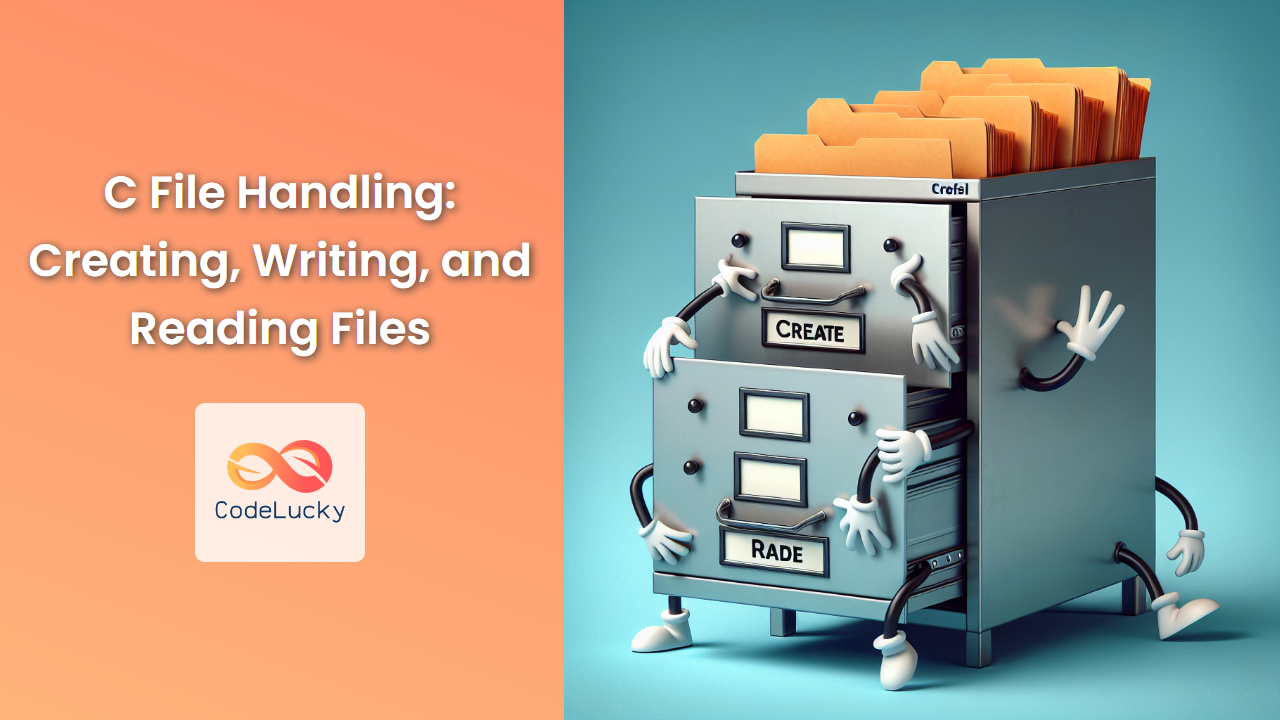File handling is a crucial aspect of programming in C, allowing developers to interact with external data sources, store information persistently, and process large amounts of data efficiently. In this comprehensive guide, we'll explore the intricacies of file handling in C, covering everything from creating and writing to files, to reading and manipulating their contents.
Understanding File Handling in C
File handling in C involves working with streams, which are sequences of bytes that can be read from or written to. The C standard library provides a set of functions that allow us to perform various operations on files, such as opening, closing, reading, and writing.
🔑 Key Concept: In C, files are treated as streams of bytes, and we use pointers to FILE structures to manipulate them.
Let's dive into the essential file operations and explore them with practical examples.
Opening a File
Before we can perform any operations on a file, we need to open it. The fopen() function is used for this purpose. It takes two arguments: the file name and the mode in which to open the file.
FILE *fopen(const char *filename, const char *mode);
Here's a simple example of opening a file:
#include <stdio.h>
int main() {
FILE *file = fopen("example.txt", "w");
if (file == NULL) {
printf("Error opening file!\n");
return 1;
}
printf("File opened successfully.\n");
fclose(file);
return 0;
}
In this example, we're opening a file named "example.txt" in write mode ("w"). If the file doesn't exist, it will be created. If it already exists, its contents will be truncated.
🚨 Important: Always check if fopen() returns NULL, which indicates that the file couldn't be opened.
File Opening Modes
C provides several modes for opening files. Here's a table summarizing the most common modes:
| Mode | Description |
|---|---|
| "r" | Open for reading (file must exist) |
| "w" | Open for writing (file is created if it doesn't exist, otherwise truncated) |
| "a" | Open for appending (file is created if it doesn't exist) |
| "r+" | Open for both reading and writing (file must exist) |
| "w+" | Open for both reading and writing (file is created if it doesn't exist, otherwise truncated) |
| "a+" | Open for both reading and appending (file is created if it doesn't exist) |
Writing to a File
Once we've opened a file, we can write to it using functions like fprintf(), fputs(), or fwrite(). Let's look at examples of each:
Using fprintf()
#include <stdio.h>
int main() {
FILE *file = fopen("data.txt", "w");
if (file == NULL) {
printf("Error opening file!\n");
return 1;
}
int age = 30;
float height = 5.9;
fprintf(file, "Age: %d\nHeight: %.1f\n", age, height);
fclose(file);
printf("Data written to file successfully.\n");
return 0;
}
This program writes formatted data to the file "data.txt".
Using fputs()
#include <stdio.h>
int main() {
FILE *file = fopen("message.txt", "w");
if (file == NULL) {
printf("Error opening file!\n");
return 1;
}
fputs("Hello, World!\n", file);
fputs("This is a test message.\n", file);
fclose(file);
printf("Messages written to file successfully.\n");
return 0;
}
fputs() is used to write strings to a file.
Using fwrite()
#include <stdio.h>
#include <string.h>
struct Person {
char name[50];
int age;
};
int main() {
FILE *file = fopen("people.dat", "wb");
if (file == NULL) {
printf("Error opening file!\n");
return 1;
}
struct Person people[] = {
{"Alice", 25},
{"Bob", 30},
{"Charlie", 35}
};
size_t num_people = sizeof(people) / sizeof(struct Person);
fwrite(people, sizeof(struct Person), num_people, file);
fclose(file);
printf("Data written to binary file successfully.\n");
return 0;
}
fwrite() is particularly useful for writing binary data or structures to a file.
Reading from a File
Reading from a file is just as important as writing to it. C provides several functions for reading file contents, including fscanf(), fgets(), and fread().
Using fscanf()
#include <stdio.h>
int main() {
FILE *file = fopen("data.txt", "r");
if (file == NULL) {
printf("Error opening file!\n");
return 1;
}
int age;
float height;
fscanf(file, "Age: %d\nHeight: %f", &age, &height);
printf("Read from file:\n");
printf("Age: %d\n", age);
printf("Height: %.1f\n", height);
fclose(file);
return 0;
}
This program reads formatted data from the "data.txt" file we created earlier.
Using fgets()
#include <stdio.h>
int main() {
FILE *file = fopen("message.txt", "r");
if (file == NULL) {
printf("Error opening file!\n");
return 1;
}
char line[100];
printf("Contents of message.txt:\n");
while (fgets(line, sizeof(line), file) != NULL) {
printf("%s", line);
}
fclose(file);
return 0;
}
fgets() is used to read strings from a file, line by line.
Using fread()
#include <stdio.h>
struct Person {
char name[50];
int age;
};
int main() {
FILE *file = fopen("people.dat", "rb");
if (file == NULL) {
printf("Error opening file!\n");
return 1;
}
struct Person person;
printf("Contents of people.dat:\n");
while (fread(&person, sizeof(struct Person), 1, file) == 1) {
printf("Name: %s, Age: %d\n", person.name, person.age);
}
fclose(file);
return 0;
}
fread() is used to read binary data or structures from a file.
File Positioning
C provides functions to manipulate the file position indicator, allowing us to read from or write to specific locations in a file.
Using fseek()
The fseek() function is used to move the file position indicator to a specific location:
#include <stdio.h>
int main() {
FILE *file = fopen("numbers.txt", "w+");
if (file == NULL) {
printf("Error opening file!\n");
return 1;
}
// Write numbers to the file
for (int i = 1; i <= 5; i++) {
fprintf(file, "%d\n", i);
}
// Move to the beginning of the file
fseek(file, 0, SEEK_SET);
// Read and print the numbers
int num;
printf("Numbers in the file:\n");
while (fscanf(file, "%d", &num) == 1) {
printf("%d ", num);
}
printf("\n");
// Move to the third number (2nd index, as indexing starts from 0)
fseek(file, 2 * sizeof(char), SEEK_SET);
fscanf(file, "%d", &num);
printf("Third number: %d\n", num);
fclose(file);
return 0;
}
This program demonstrates how to use fseek() to move to different positions in the file.
Using ftell()
The ftell() function returns the current value of the file position indicator:
#include <stdio.h>
int main() {
FILE *file = fopen("sample.txt", "w+");
if (file == NULL) {
printf("Error opening file!\n");
return 1;
}
fputs("Hello, World!", file);
long int pos = ftell(file);
printf("Current position: %ld\n", pos);
fseek(file, 0, SEEK_SET);
pos = ftell(file);
printf("Position after fseek: %ld\n", pos);
fclose(file);
return 0;
}
This example shows how to use ftell() to get the current file position.
Error Handling in File Operations
Proper error handling is crucial when working with files. Here's an example that demonstrates how to handle various file operation errors:
#include <stdio.h>
#include <errno.h>
#include <string.h>
int main() {
FILE *file = fopen("nonexistent.txt", "r");
if (file == NULL) {
printf("Error opening file: %s\n", strerror(errno));
return 1;
}
// File operations would go here
if (fclose(file) != 0) {
printf("Error closing file: %s\n", strerror(errno));
return 1;
}
return 0;
}
This program attempts to open a non-existent file and demonstrates how to use errno and strerror() to provide meaningful error messages.
Advanced File Handling Techniques
Working with Temporary Files
Temporary files are useful for storing intermediate data that doesn't need to be persisted. C provides the tmpfile() function for creating temporary files:
#include <stdio.h>
int main() {
FILE *temp = tmpfile();
if (temp == NULL) {
printf("Error creating temporary file!\n");
return 1;
}
fprintf(temp, "This is temporary data.\n");
// Move to the beginning of the file
rewind(temp);
char buffer[100];
fgets(buffer, sizeof(buffer), temp);
printf("Read from temp file: %s", buffer);
fclose(temp);
return 0;
}
This example creates a temporary file, writes to it, and then reads the data back.
File Locking
When multiple processes or threads access the same file, file locking becomes important to prevent data corruption. While C doesn't provide built-in file locking functions, you can use system-specific functions like flock() on Unix-like systems:
#include <stdio.h>
#include <sys/file.h>
#include <unistd.h>
int main() {
FILE *file = fopen("shared.txt", "w+");
if (file == NULL) {
printf("Error opening file!\n");
return 1;
}
int fd = fileno(file);
if (flock(fd, LOCK_EX) == -1) {
printf("Error locking file!\n");
fclose(file);
return 1;
}
fprintf(file, "This is protected data.\n");
sleep(5); // Simulate some work
if (flock(fd, LOCK_UN) == -1) {
printf("Error unlocking file!\n");
}
fclose(file);
return 0;
}
This example demonstrates how to use flock() to implement file locking. Note that this is a Unix-specific solution and won't work on all systems.
Best Practices for File Handling in C
- 🔒 Always close files after you're done with them using
fclose(). - 🚦 Check the return values of file operations to handle errors gracefully.
- 🧹 Use appropriate file modes to prevent accidental data loss.
- 🔍 When reading from files, always check for EOF (End of File) conditions.
- 🛡️ Use file locking mechanisms when working with shared files in multi-process or multi-threaded environments.
- 📊 For large files, consider using buffered I/O functions for better performance.
- 🔢 Be mindful of file permissions when creating or opening files.
Conclusion
File handling is a fundamental skill for C programmers, enabling the creation of more robust and data-driven applications. This guide has covered the essentials of creating, writing to, and reading from files in C, along with more advanced topics like file positioning and error handling.
By mastering these concepts and following best practices, you'll be well-equipped to handle a wide range of file-related tasks in your C programs. Remember to always handle errors gracefully and close your files when you're done with them to ensure the integrity of your data and the efficiency of your programs.
Happy coding, and may your files always be in order! 📁✨

















